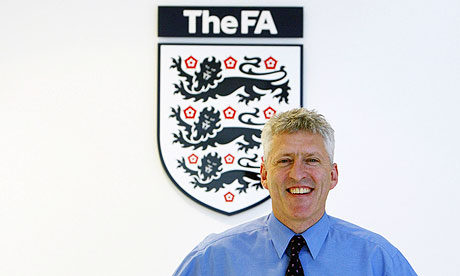
From Adam Crozier to Ian Watmore, a decade of chairs and chiefs: what they did and why they went
Mark Palios, former chief executive of the Football Association, in a photograph released on the day of his appointment in 2003. Photograph: PAAdam Crozier
Chief executive, 2000-2002
Main challenge Modernisation of the organisation, plus to oversee an improvement of the England national team with the aim of winning a first major competition since 1966.
What he achieved Replaced the 91-strong board with a 12-member committee while lowering the average age of FA employees from 55 to 32. Crozier was also commercially successful and appointed Sven-Goran Eriksson, who became England's first foreign manager.
Downfall Fell out with Thompson owing to his unilateral decision making, and with Premier League clubs after he signed a deal for England players without their consultation. Resigned.
Mark Palios
Chief executive, 2003-2004
Main challenge To stabilise the FA's financial situation by resolving the financing of the Wembley Stadium project.
What he achieved Saved the FA from having to borrow a scheduled £140m that would have put it into further financial jeopardy and secured a syndicated finance deal for the new stadium. Stood up to Rio Ferdinand when he missed a drug test by telling Eriksson to drop him for a crucial England qualifier for Euro 2004. Overhauled the FA's disciplinary process, resulting in speedier hearings and lower costs.
Downfall In August 2004 Palios resigned after his relationship with Faria Alam, an FA secretary, prompted a botched attempted cover‑up by Colin Gibson, then the head of communications The News of the World was offered information on Eriksson's own involvement with Alam in return for agreeing not to publish on Palios. When the newspaper revealed this, he resigned.
Brian Barwick
Chief executive, 2005-2008
Main challenge Negotiation of TV rights and replacing Eriksson following the 2006 World Cup. Also, to ensure the England National Football Centre (now called St George's Park) at Burton would open.
What he achieved Appointed Steve McClaren, who failed to secure qualification for Euro 2008. Replaced McClaren with Fabio Capello, who would go on to oversee England's flop at this summer's World Cup. In 2007 negotiated with ITV and Setanta to broadcast the FA Cup and England's home internationals in a four-year £425m deal. In June 2009 Setanta entered administration and the FA ended the contract.
Downfall Barwick eventually resigned when Triesman was appointed, with the new FA chairman unimpressed by his commercial acumen.
Lord Triesman
Chairman, 2008-2010
Main challenge Push through remaining reforms of Burns review, which were to introduce independent non-executives to the FA board and reform the FA Council to represent better the game and wider society. As head of the 2018 World Cup bid, to ensure the competition came to these shores.
What he achieved Failed on the Burns reforms and his departure as FA chairman earlier this year harmed the 2018 bid. In October 2008 he also criticised Premier League debt which was viewed as politically naive.
Downfall Made comments to Melissa Jacobs, a personal acquaintance, about alleged attempts by Spain and Russia to bribe referees at the 2010 World Cup. He resigned when the quotes appeared in the Mail on Sunday.
Ian Watmore
Chief executive, 2009-2010
Main challenge To employ his business background to ensure the FA clawed back finance spent on Wembley and finally ensure the National Football Centre at Burton would open.
What he achieved National Football Centre will open but he clashed with the Premier League chairman, Sir Dave Richards, and failed to reform the FA's disciplinary procedures.
Downfall His sharing of information to colleagues was leaked to a daily newspaper and prompted the following angry email from Watmore: "I don't know which sad person thought to brief yesterday but we know it had to be from this list as you are the only people who received it." Resigned owing to general frustration with the FA's machinations.{jcomments on}
 HABERLER & MAKALELER
HABERLER & MAKALELER 

































